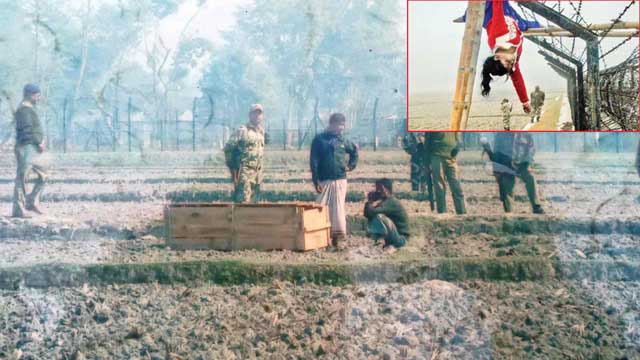The Indian National Human Rights Commission is yet to reply to a letter sent by its Bangladesh counterpart citing the killing of Felani Khatun by the Indian Border Security Force and seeking effective advocacy with the Indian government to address continued killings of Bangladeshis.
Nasima Begum, the then chairman of the National Human Rights Commission, sent the letter on November 29, 2021, to her counterpart, Arun Kumar Mishra, the incumbent chairman of the Indian rights watchdog.
The NHRC officials told New Age that India formally did not reply to their letter while the then chairman, Nasima, inquired about the matter with Indian rights officials on the sidelines of the 3rd United Nations South Asia Forum on Business and Human Rights held in Dhaka between March 28 and March 30, 2022.
The Bangladeshi rights commission in the letter stated that children in the bordering areas are victims of ‘reckless use of lethal weapons’ and many people are living with splinters in their bodies.
BSF on the Anantapur border under Phulbari upazila in Kurigram on January 7, 2011, shot 15-year-old Felani to death when she was returning home crossing barbed-wire fences erected by India.
Her body was hanging on the barbed wire fence for more than four hours, triggering a huge reaction.
The BSF member, Amiya Ghosh, who allegedly killed the teenager, faced two phases of trial in Indian courts but was acquitted on both occasions.
‘As you are aware the killing of Bangladesh girl Felani at the India-Bangladesh border by BSF in January 2011 created mass grievance both in India and Bangladesh. Human rights defenders in both countries raised concerns on this,’ said the letter.
The letter also mentioned the injury of Rasel, a Bangladeshi boy who was blinded in a BSF attack in the same Kurigram district in 2018.
‘As you are aware that the killings of Bangladeshi people at the India-Bangladesh border by the BSF of India has remained a matter of serious concern for the people of Bangladesh. The recurrence of the killings is considered as a serious rights violation,’ said the letter.
It added that killings for suspicious activities cannot be accepted at all and the alleged people should be brought to justice as every person has the right to seek justice and should have the chance to defend themselves against any blame brought.
After the Bangladesh rights commissioner sent the letter, Bangladeshi rights group Ain O Salish Kendra recorded the deaths of at least 16 Bangladeshis in BSF firings in 2022.
BSF allegedly killed at least three Bangladeshis so far in 2023.
Kirity Roy, secretary of the West Bengal-based Banglar Manabadhikar Suraksha Mancha, told New Age on Friday that because India has not taken meaningful action, the killings, torture, and rape of both Bangladesh and India by the BSF have continued.
On July 29, 2015, Fenali’s father, Mohammad Nurul Islam, and Kirity Roy of Masum jointly filed a writ petition with the Supreme Court of India and prayed for the constitution of a Central Bureau of Investigation team consisting of officers from outside the state of West Bengal to take over the investigation of the case and prosecute the offenders in accordance with the law.
In February 2020, an Indian High Court bench posted the Felani killing case for further hearing on March 18, after the Indian government had submitted its argument during the hearing.
Kirity Roy said all the respondents had replied to the High Court by now, but the matter was yet to be heard.
On August 19, 2011, Felani’s parents travelled to the BSF office at Cooch Behar to give evidence before the Security Force Court at the trial of constable Amiya Ghosh but they were neither allowed to attend nor observe the trial.
On September 6, 2013, the BSF constable, Amiya Ghosh, was acquitted.
Anguished by the decision of the Security Force Court, the victim’s father wrote a letter to the High Commissioner of India in Dhaka and Masum, asking the Indian government to take action against the constable, who killed his daughter.
Felani’s father also asked for compensation.
On November 17, 2014, the father travelled to India and gave evidence before the Review Court, but said that they were not permitted to attend the rest of the proceedings.
Her death anniversary is going to be observed across the country at a time when the country is witnessing continued border killings.
New Age Correspondent in Kurigram reported that a special prayer would be held today to mark the day.
‘We were supposed to get compensation, but we haven’t yet. We can’t even get a fair trial for our daughter’s murder. We don’t know if we will get justice for killing our daughter,’ said Felani’s father.
In Dhaka, a platform called the national committee to resist aggression will hold a discussion at the National Press Club to mark the day.
According to Odhikar, a rights organisation, at least 1,236 Bangladeshis were killed and 1,145 injured in shootings by the BSF between 2000 and 2020.
India and Bangladesh agreed to reduce border killings to zero during prime minister Sheikh Hasina’s state visit to India on September 5-8 at the invitation of Indian prime minister Narendra Modi.





